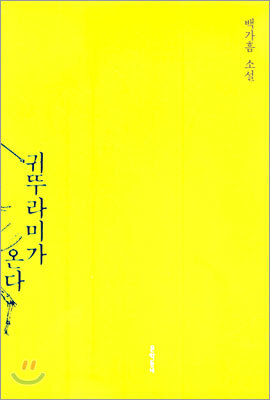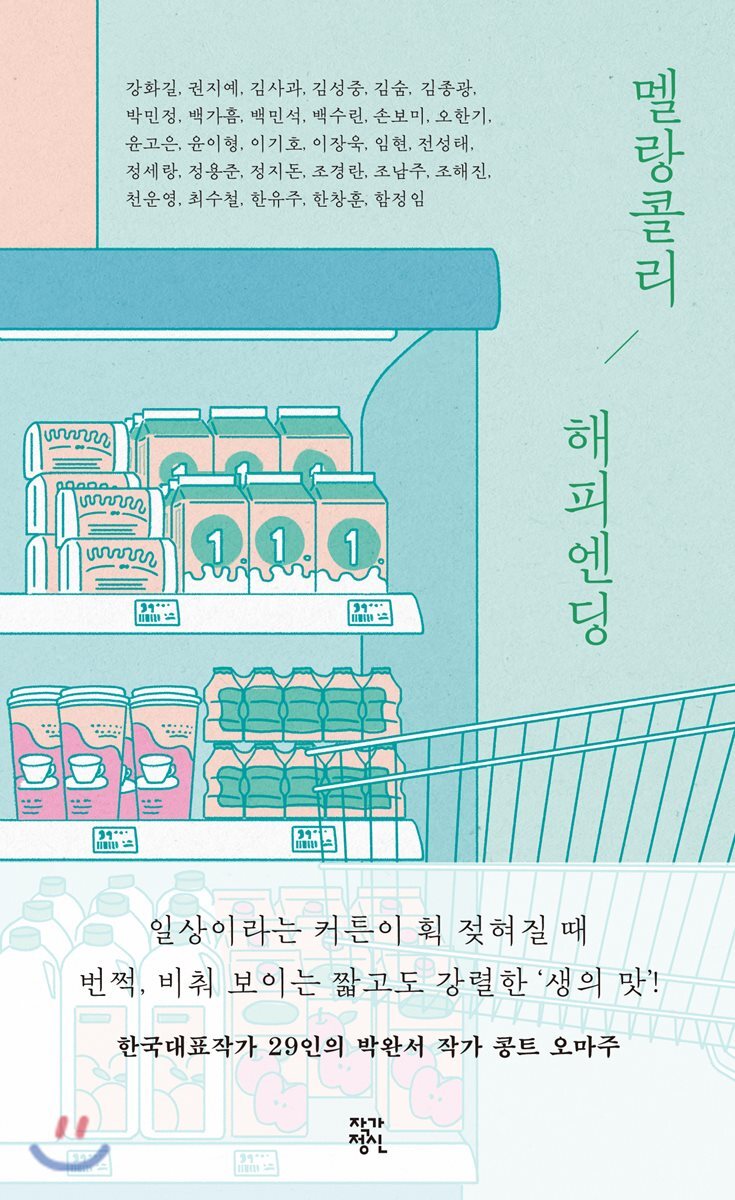Paik Gahuim (born 1974) is a modern South Korean writer.
Life
Paik Gahuim was born in Iksan, South Jeolla Province. He studied creative writing at Myongji University. Paik made his literary debut in 2001 when his short story "Gwangeo" (광어 Flounder) won the Seoul Shinmun New Writer's Contest. He is the author of five short story collections and three novels including Sasipsa (四十四 Forty-four) and Madam ppaengdeok (마담뺑덕 Madam Ppaengdeok). He is currently professor of creative writing at Keimyung University.
Writing
Paik's work often makes readers feel uncomfortable, as in the case of his debut story which begins with a detailed description of filleting a flounder and then progresses to a portrayal of the narrator having intercourse with a girl from a hostess bar while imagining the inside of his mother’s womb. "Baekkochi jinda" (배꽃이 진다 When the Pear Blossoms Fade) describes the shocking abuse of children and the handicapped. In "Welkeom, beibi!" (웰컴, 베이비! Welcome, Baby!) a young child watches a middle-aged couple have intercourse from inside a motel room closet, an infant without eyes or ears is abandoned, and a man tries to hang himself from a fan. In "Gwitturamiga onda" (귀뚜라미가 온다 Cricket is Coming), an aged mother who is beaten by her own son plans to end both their lives through joint suicide, while "Gudu" (구두 Dress Shoes) features a father who kills his entire family and then takes his own life. Although these ruthless stories fill readers with much discomfort, they are not too far-fetched, for the media are full of real-life stories like these. "Baeui mudeom" (배의 무덤 The Tomb of a Ship) describes blood-curdling crime in a small port town. The return of a criminal past the statute of limitations to his hometown results in vengeful violence and murder, a subversion of dichotomy between good and evil.
Paik's characters tend to be the neglected and marginalized—those who are both socially and economically on the bottom rung of society: prostitutes, itinerant manual laborers, sailors running from the law, the mentally and physically handicapped, the elderly homeless living in condemned buildings, and women who are physically and sexually abused. A great number of these characters suffer from speech disorders or lack the mental capacity to recognize the gravity of the situation; the few who do realize their dire circumstances are without the proper education to articulate themselves.
Las obras de Paik a menudo hacen sentir incómodos a los lectores. En el caso de su relato de debut, comienza con una detallada descripción de cómo se corta en filetes un lenguado y luego pasa a la descripción del narrador teniendo sexo con una chica de un bar de alterne a la vez que se imagina dentro del útero de su madre. En "Cuando se marchitan las flores del peral", se describe el abuso de niños y minusválidos. En "Bienvenido, bebé", un niño pequeño mira a una pareja de mediana edad tener sexo desde el armario de una habitación de motel, alguien abandona a un niño sin ojos ni oídos y un hombre intenta colgarse de un ventilador. En "Se viene el tifón", una madre que es golpeada por su propio hijo planea acabar con la vida de ambos; y en "Los zapatos" habla sobre un padre que mata a toda su familia y después se suicida. Aunque estas despiadadas historias incomodan al lector, no son inverosímiles, puesto que las noticias, la televisión e internet están llenos de historias como estas.5
Los personajes de Paik suelen ser seres abandonados y marginados, personas que se encuentran en la escala social y económica más baja: prostitutas, obreros sin residencia fija, marineros que huyen de la ley, minusválidos físicos y mentales, viejos vagabundos que viven en edificios que van a ser demolidos y mujeres maltratadas físicamente. Un gran número de estos personajes sufren desórdenes en el habla o no tienen la capacidad mental suficiente para reconocer la gravedad de la situación; y los pocos que se dan cuenta de sus circunstancias no tiene la educación suficiente para expresarse.6
L'écriture de Baek rend souvent les lecteurs mal à l'aise, comme dans le cas de son premier récit qui commence par une description détaillée de filets de poissons péchés, en l'occurrence des sortes de turbots, avant de placer son narrateur dans une scène érotique en compagnie d'une fille de bar à hôtesses où le narrateur imagine l'intérieur du ventre de sa mère... Quand les fleurs des poiriers se fanent (Baekkochi jigo) décrit les abus scandaleux pratiqués sur les enfants et les handicapés. Dans Bienvenue, bébé ! (Welkeom, be-ibi) un jeune enfant à l'intérieur d'un placard dans une chambre de motel surprend un couple d'adultes ayant des rapports sexuels; dans ce roman,il y a aussi un bébé sans yeux et sans oreilles qui se retrouve abandonné, et un homme qui tente de se pendre à un ventilateur. Dans Et voilà le typhon Cricket (Gwitturamiga onda), une mère âgée, battue par son propre fils, envisage un suicide collectif pour se supprimer elle et son fils. Dans Chaussures pour robe (Gudu), un père décide de tuer toute sa famille, puis finit par se suicider. Bien que ces histoires impitoyables plongent le plus souvent le lecteur dans le désarroi, elles ne sont pas pour autant dénuées de logique : l'auteur s'inspire essentiellement d'histoires qu'il lit ou entend dans les journaux, à la télévision, ou sur Internet3. La tombe d'un bateau (Bae-ui mudeom) dépeint une scène de crime dans une petite ville portuaire : le roman décrit le retour d'un criminel dans sa ville natale une fois le délai de prescription passé, retour qui va le pousser à étancher sa soif de vengeance. Baek présente ici le rapport dichotomique entre le bien et le mal.
Ses personnages ont tendance à être des personnes vivant en marge de la société, qui sont à la fois socialement et économiquement sur l'échelon le plus bas de la société : prostituées, travailleurs manuels itinérants, marins hors-la-loi, handicapés, personnes âgées sans abri vivant dans des bâtiments condamnés, femmes physiquement et sexuellement abusés... Un grand nombre de ces personnages souffrent de troubles de la parole ou n'ont pas la capacité mentale pour reconnaître la gravité des situations auxquelles ils sont confrontées ; les quelques personnes qui prennent conscience de leur sort n'ont pas reçu suffisamment d'éducation pour s'exprimer et s'en sortir3.
Paik Gahuim wurde am 26. Juli 1974 in Iksan, Provinz Nord-Chŏlla geboren. Er debütierte 2001, als seine Kurzgeschichte Plattfisch (광어) einen Literaturwettbewerb gewann. Seine Geschichten hinterlassen beim Leser meist ein unbehagliches Gefühl, so auch im Fall seines Debütwerks, welches mit der detaillierten Anleitung zum Filetieren eines Plattfisches anfängt und dann übergeht in eine Darstellung des Erzählers, der Geschlechtsverkehr mit einer Barhostesse hat, während er an das Innere des Bauches seiner Mutter denkt. Die Geschichte Die Birnenblüten verblühen (배꽃이 지고) beschreibt den schockierenden Missbrauch von behinderten Kindern. In einem anderen Werk, Welcome, Baby (웰컴, 베이비), schaut ein Kind, das sich in einem Kleiderschrank in einem Motel befindet, einem Pärchen beim Geschlechtsverkehr zu, ein Säugling ohne Augen und Ohren wird ausgesetzt und ein Mann versucht sich an einem Deckenventilator aufzuhängen. In Hier kommt die Grille (귀뚜라미가 온다) entscheidet sich eine Mutter, die von ihrem eigenen Sohn misshandelt wird, gemeinsam mit diesem Selbstmord zu begehen, und in Schuhe (구두) ermordet ein Vater seine ganze Familie und nimmt sich dann selber das Leben. Obwohl all diese unbarmherzigen Geschichten beim Leser Unbehagen hervorrufen, sind sie nicht von allzu weit hergeholt, da sowohl Zeitungen, Fernsehen wie auch Internet voll solcher Geschichten sind.
Paiks Charaktere neigen dazu, vernachlässigt und verdrängt zu werden – Charaktere, die sich sowohl sozial wie auch ökonomisch am Boden der Gesellschaft befinden: Prostituierte, Wanderarbeiter, Matrosen, die vor dem Gesetz fliehen, geistig und körperlich Behinderte, obdachlose Senioren in verlassenen Gebäuden und Frauen, die körperlich oder sexuell misshandelt wurden. Ein großer Teil seiner Charaktere leidet an Sprachstörungen oder besitzt nicht die nötige Zurechnungsfähigkeit, um zu begreifen, wie ernst die Situation ist, in der sie sich befinden. Die, die ihre Situation voll und ganz verstehen, haben nicht genug Bildung genossen, um sich zu artikulieren.
In seiner Prosa beleuchtet er die dunkelsten Flecken der Gesellschaft, indem er diese grauenvollen Seiten beschreibt. Auch wenn es Lesern schwerfallen mag, sich mit diesen negativen Aspekten auseinanderzusetzen, die man am liebsten ignorieren würde, so erinnert uns Paik daran, dass Anerkennung und Akzeptanz die Voraussetzungen für die Lösung der Probleme sind.[3]
現時代が陥ってしまった狂気と、まともでない現実を、アイロニーとファンタジーで表す作家である。作家の初めての小説集である『コオロギが来る』(2005)を通して、独自のユニークな小説手法を見せている。ここに登場する人物のほとんどは苦しい人生を送っている。しかし、作家は、繰り返される困窮と暴力に晒された主人公たちが置かれた状況から逃れられるような状況、あるいは何らかの希望のようなものを提示することなく、凄絶な人生の裏面を赤裸々に表すだけである。
長編小説『ナフタリン』(2012)では、山間に位置した修練院を背景にして起きた様々な事件を、オムニバス形式で織り成した。この作品は、スピーディな展開、単純かつ乾燥した文体でもって、暗いテーマを変化のあるものに形象化した。人生の本質に迫ろうとす彼の意志がよく現れている。
백가흠(1974~)은 대한민국의 소설가다.
생애
백가흠은 1974년 전라북도 익산에서 태어났다. 명지대학교 문예창작학과를 졸업했으며, 2001년 《서울신문》 신춘문예에 단편소설 〈광어〉가 당선되면서 작품 활동을 시작했다.
작가는 모순적이고 비극적이며 불편한 현실을 살아가고 있는 인물들을 작품의 주요한 동력으로 삼아, 당대의 사회적인 문제들에 대해서 질문을 던지는 작품들을 활발하게 발표하고 있다. 작가는 작품 활동을 하면서 계명대학교 문예창작과 교수로 일하고 있다.
작품 세계
백가흠은 비극적인 일상을 견디는 사람들의 이야기와 죽음과 소멸 그리고 보편적인 삶의 윤리, 자기반성적 대상으로서의 개인 등을 주제로 삼은 작품들을 발표해오고 있다.
《귀뚜라미가 온다》(2005)는 2001년 작품 활동을 시작한 작가의 첫 소설집으로, 표제작 〈귀뚜라미가 운다〉를 포함, 총 아홉 편의 단편이 수록되어 있다. 《귀뚜라미가 온다》는 비극적인 일상으로 인해 피폐해진 사람들의 이야기 그리고 '피학적 헌신', '가학적 폭행', '강간' 등 기이한 방식으로 사람들과 관계를 맺는 인물들을 절제된 언어와 구성을 통해 보여준다. 이 소설집의 주인공은 모두 남자로 모든 이야기는 남성의 입장에서 전개되는데, 작품 속 인물들의 내면은 황폐해져있어서 모든 일이 불가항력적으로 여겨진다. 특히 이들은 모성에 대한 질투, 경쟁과 소유욕, 잔인한 폭력 등으로 각자의 존재를 확인할 뿐이다.
소설집 《조대리의 트렁크》(2007)는 백가흠의 두 번째 단편집으로, 신문의 사회면에 실릴만한 사건에 관련된 인물들의 이야기를 객관적이고 냉정한 시선으로 담아내었다. 유아 유기(遺棄)와 영아 매매, 노숙자와 가출 청소년 등 비극적인 사건의 주인공들은 ‘가족’을 이루고 싶다는 열망과 그렇지 못한 현실로 인해 뒤틀린 내면으로 살아가고 있는데, 이들을 통해 작가는 일상에서 우리가 견지해야 할 윤리에 대해서 질문을 던지고 있다.
장편소설 《나프탈렌》(2012)은 작가의 첫 장편으로, 작가의 다른 작품들과 달리, 시간과 공간의 측면에서 확장된 서사, 상처받은 사람들의 다양한 모습들, 그리고 인간들의 보편적인 삶과 죽음을 전면적으로 다루고 있다.
소설집 《사십사》(2015)는 일상에 대한 자기성찰과 반성을 통해 작가는 거대하고 제도 속에 놓인 비극적인 자아가 아니라 집단의 문제에서 쉽게 외면되어 온, 소박하지만 현실적인 개인의 모습을 연민의 시선으로 담아내고 있다. 이후에 출간된 소설집 《같았다》(2021)에서 작가는 낯설고 기이한 서사를 통해, 현실의 윤리에 대해 질문을 던지고 있다.
주요 작품
1) 소설집
《귀뚜라미가 온다》, 문학동네, 2005(개정판, 2011).
《조대리의 트렁크》, 창비, 2007.
《힌트는 도련님》, 문학과지성사, 2011.
《사십사》, 문학과지성사, 2015.
《같았다》, 문학동네, 2021.
2) 장편소설
《나프탈렌》, 현대문학, 2012.
《향》, 문학과지성사, 2013.
《마담뺑덕》, 네오픽션, 2014.
3) 산문집
《그리스는 달랐다》, 난다, 2017.




